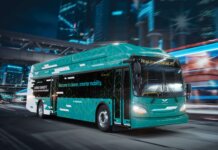FuelCell Energy Inc. and Toyota Motor North America Inc. celebrated the grand opening of the first-of-its-kind “Tri-gen” system at the Port of Long Beach, Calif. Tri-gen uses biogas to produce renewable electricity, renewable hydrogen and usable water.
The system was built to support the vehicle processing and distribution center for Toyota Logistics Services (TLS) at Long Beach, Toyota’s largest North American vehicle processing facility that receives about 200,000 new Toyota and Lexus vehicles annually.
“The goal of our collaboration with FuelCell Energy was to find sustainable solutions for the TLS vehicle processing facility here at the Port of Long Beach as part of our goal to remove carbon dioxide emissions from our operations,” says Tom Stricker, group vice president of Sustainability and Regulatory Affairs at Toyota. “This groundbreaking facility shows that there are ways to reduce our emissions and burden on natural resources with scalable technology based on hydrogen.”
Thanks to FuelCell Energy’s Tri-gen platform, TLS Long Beach is Toyota’s first port vehicle processing facility powered by 100% on-site generated renewable electricity. FuelCell Energy’s fuel cell technology uses an electrochemical process that converts directed renewable biogas into electricity, hydrogen and usable water with a highly efficient, combustion-free process that emits virtually no air pollutants.
“Tri-gen demonstrates that hydrogen-based energy can benefit businesses, deliver zero-emission transportation for light- and heavy-duty vehicles, support improved air quality in local communities, reduce water usage, and deliver immediate and long-term benefits to the environment,” adds Jason Few, FuelCell Energy CEO and president. “As a company, we are living our purpose when we enable visionary customers like Toyota to decarbonize their operations and harness the energy solutions offered by hydrogen — all while leaving communities with cleaner air and easing the strain on power grids and water supplies.”
Tri-gen produces 2.3 megawatts of renewable electricity, part of which will be used by TLS Long Beach to support its operations at the port. Excess electricity is delivered to the local utility, Southern California Edison, under the California Bioenergy Market Adjustment Tariff (BioMAT) program. Tri-gen can also produce up to 1,200 kg/day of hydrogen for the fueling needs of Toyota’s incoming light-duty fuel cell electric vehicle (FCEV) Mirai while also supplying hydrogen to the adjacent heavy-duty hydrogen refueling station to support TLS logistics and drayage operations at the port.
The water byproduct of hydrogen generation can produce up to 1,400 gallons per day of usable water, which is being repurposed for TLS car wash operations for vehicles that come into port before customer delivery. This helps reduce the demand on the constrained local water supplies by approximately half a million gallons per year.
By supporting TLS operations at the Port of Long Beach, Tri-gen is expected to help reduce more than 9,000 tons of CO2 emissions from the power grid annually. Tri-gen will also help avoid more than six tons of grid NOx (nitrogen oxide) emissions. Using hydrogen-powered fuel cell Class 8 trucks in port operations could reduce diesel consumption by more than 420,000 gallons per year.






